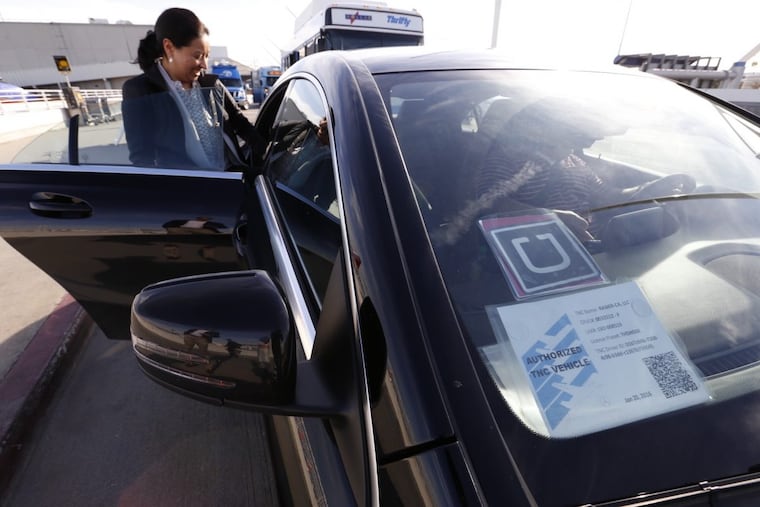New Uber Express Pool offers cheaper ride, less convenience
A cheaper Uber service means people will have to take a walk for their ride, but it will save them money.

Two years ago, almost to the day, Uber introduced to Philadelphia what was then a new concept: a pool service that allowed riders to share a trip with strangers heading their way for a reduced fare.
On Thursday, Uber will introduce a new wrinkle on that idea. It's a pool service, but instead of the door-to-door delivery that was one of Uber's hallmarks, riders will have to walk a few blocks to meet their ride and, after drop-off, a few blocks to reach their destination. In return, they get a trip 50 percent cheaper than an UberPool ride, which itself costs less than the one-passenger, one-car service UberX.
The San Francisco tech company is calling the new service Express Pool, and it represents an opportunity for Uber to expand its customer base even more deeply in Philadelphia in a quest for profitability.
"The goal here is to attract someone who might not use Uber at all, unless it costs less," said John Pearce, a professor of management and operations at Villanova University's business school.
Uber's business model, he said, eschews short-term profits to attract a broad customer base. Uber is typically valued at almost $70 billion, according to recent Bloomberg coverage, but has reported total losses up to $4 billion. Pearce compared the business to Amazon, which was in the red for a decade but spent that time becoming ubiquitous in American shopping. That company has reported steady profits since 2015.
"You have an ever-increasing revenue base," Pearce said. "More people are willing to buy into your service. Once they have bought into the service, then the company can reassess what the pricing has to be."
He sees Uber as potentially following Amazon's example by accumulating a huge number of regular customers. Express Pool has the potential to become a much more efficient service, the company has said. It allows drivers to take more direct routes, rather than weaving around the city to the doorsteps of each passenger.
"More experienced drivers don't like doing Pool," said Angela Vogel, an Uber Black driver and advocate for ride-share drivers who said the winding course of Pool trips is uncomfortable for some behind the wheel. "That safety issue does seem like it'd be addressed with this Express Pool."
The service would create less wear on cars and less fuel used per trip.
Uber guarantees a rate of pay for drivers regardless of the type of service ordered to ensure participation in a service that's much cheaper for the customers. That gets expensive for Uber in what the company calls unmatched rides, in which a person orders an UberPool, but no one else gets into the car over the course of the trip. There's little revenue generated on those trips, and it can lead to Uber subsidizing the ride to ensure that the driver is paid the guaranteed rate, creating a loss for the company.
Express Pool increases the match rate, Uber reported, making it less likely the company will lose money on trips even with the drastically reduced fare.
"If they can carry several passengers on a more direct trip then, together with an opening to raise fares for UberX, I'd say they have a chance of actually becoming profitable," said Jonas Maciunas, a principal of JVM Studio, a Philadelphia urban design consulting firm.
He noted that the service also has the potential to help reduce traffic in the city because Uber can now choose to drop off and pick up passengers at locations where there is space for a car to pull over and stop.
Express Pool riders would have to accept longer waits for their rides, Uber reported. Uber will continue offering the UberPool, UberX, and Uber Black services, each a tier of service offering a more convenient trip, for a price.
Uber's quest to secure a larger share of the market has already led to brutal competition with the city's taxis that have left that industry decimated. Uber is also competing with another ride share business, Lyft, in Philadelphia. SEPTA has expressed concerns that ride sharing is cutting into bus ridership, and Uber's statement on Express Pool made explicit that it is looking for some of the same riders who take the bus.
"We're excited that with Express Pool's affordability and consistency, riders can use it every day," Ethan Stock, an Uber product director, said in a statement.
Uber isn't likely to wholesale replace SEPTA buses, said Erick Guerra, assistant professor of city and regional planning at the University of Pennsylvania, because that would require drivers to have access to vehicles larger than the typical personal vehicle.
The pricing for Express Pool, though, does put it in the range of public transportation trips, and Guerra does see the possibility that Express Pool could be another step in a move toward private ownership of services similar to public transportation. And that's not necessarily a bad thing, he said.
"I think that there's a lot of potential," Guerra said. "The more different types of transit service we try to provide, I think the better off we make the people who are trying to get around the region."